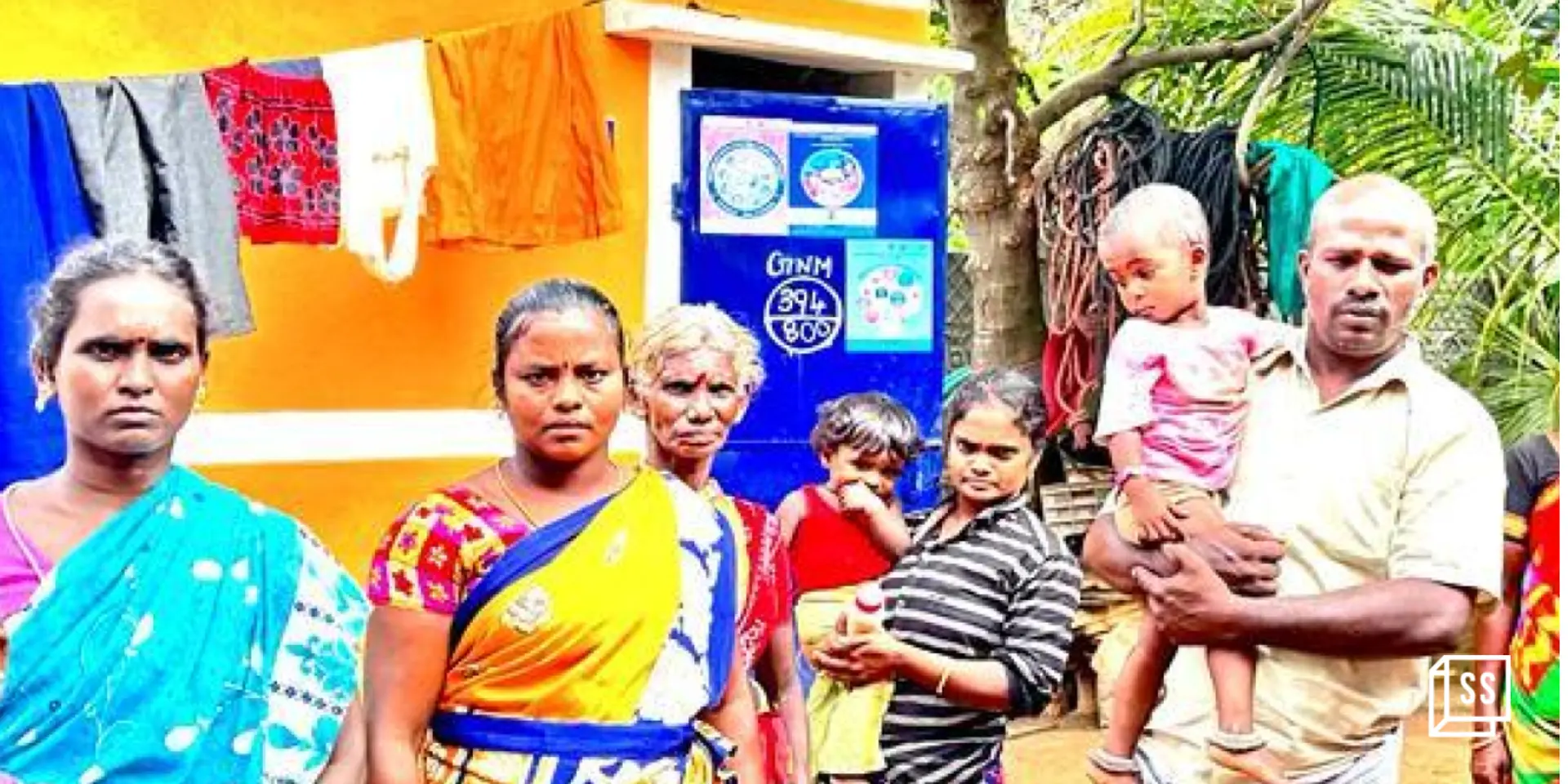Zero-waste and hygienic villages: How Gramalaya improves rural women's health
Gramalaya’s WASHMAN Project, backed by Bank of America, has given 260 homes in Mullikapatti village in Tamil Nadu’s Pudukottai district clean toilets and eco-friendly menstrual hygiene alternatives.
For the first time in 41 years, S Selvarani has seen a change in women’s hygiene and sanitation facilities in her village of Mullikapatti in Tamil Nadi’s Pudukkottai district.
Growing up with seven sisters in a thatched-roofed house, Selvarani would always have to go outdoors amid dense vegetation to relieve herself or change sanitary pads during her period.
Until six months ago, this was the drill for every adolescent girl and woman in Mullikapatti. They would have to wake up before the crack of dawn to relieve themselves in the fields, and do laborious physical work even on days of heavy period flow, wearing a single sanitary napkin for hours on end.
“We hadn’t looked at these issues as anything more than small inconveniences all our lives, because this was the way we have always lived in the village,” Selvarani tells SocialStory. “But despite being normalised, these challenges had lasting impacts on our health, safety, time, and ability to rest. I suffered with infections and pain for years because of these unhygienic menstrual and reproductive health conditions.”
Today, Mullikkapatti village has become the talk of the Neppugai panchayat where it is located. Two-hundred-and-sixty homes in the village have spanking new concrete bathrooms with toilets, and almost every woman of menstruating age has switched to washable and reusable cloth pads—setting a model standard in sanitation and menstrual hygiene in the panchayat, according to the Panchayat President S Arumugam.
These changes have been the result of NGO Gramalaya’s WASHMAN (Water, Sanitation, Hygiene education, Menstrual hygiene and Nutrition) project. Backed by Bank of America, the initiative has enabled 159 villages in Pudukkottai district in Tamil Nadu to become ‘zero-waste’ villages. The overarching goals of the WASHMAN project include hygiene education coupled with menstrual hygiene management and nutrition awareness education.

S Damodaran, Founder and CEO of Gramalaya
“Under the project, adolescent girls and women are given menstrual hygiene education and encouraged to use eco-friendly reusable cloth pads with the help of social marketing to the communities by the trained health educators from our NGO. School-going girls in Pudukkottai district are provided Menstrual Hygiene Management (MHM) education through interactive sessions and Information Education Communication (IEC) materials designed by us,” says S Damodaran, Founder and CEO of Gramalaya.
The NGO has been working in the fields of water, sanitation, and hygiene across rural, urban, coastal and tribal areas for the last 36 years.
Connecting the dots
Damodaran, who received the Padma Shri honour for social work last year, says the WASHMAN project was conceptualised and designed to offer a multi-pronged approach to sanitation challenges in villages with less than 10% toilet coverage.
Typically, he says, these villages carry the menace of open defecation, which pollutes water bodies and in turn leads to waterborne diseases such as typhoid, cholera, diarrhoea, and worm infections. “In order to prevent these outbreaks, we provide toilets and train villagers to use and maintain them. As this requires 24x7 water, we ensure all these homes get piped water supply under the central government’s Jal Jeewan Mission,” he says.
“The water from domestic use is released into kitchen gardens that we have helped these families maintain. Many of our women heads of families have earned money selling the vegetables they grow in these gardens,” adds Damodaran.
However, just constructing new toilets and maintaining the water supply may not course-correct years of poor sanitation and health practices if people are not made aware of better alternatives. Gramalaya, as part of the WASHMAN project, has been teaching children in schools and doing door-to-door campaigns in homes to inculcate handwashing as a routine practice after using the toilet, before feeding children, and before cooking.
“We finally address menstrual hygiene and nutrition in these villages that have zero period-friendly infrastructure. Our health educators train 5-10 women volunteers in each village to spread the benefits of sustainable menstrual products, and how to use, clean and sterilise them in the sun,” says Damodaran. “We also address the high prevalence of anaemia in women and stunted growth in children due to poor nutrition, and educate them on how all these aspects are intrinsically connected.”
Creating local leaders for sustained change
Gramalaya has trained self-help groups in Tiruchirappalli district in Tamil Nadu and Jogulamba Gadwal district in Telangana to stitch menstrual cloth pads for the WASHMAN project, which won the Dalmia Bharat CSRBOX CSR Impact award.
Selvarani, who trained as a WASHMAN volunteer in Mulikkapatti, says she had to work with women for weeks at length to get them to even begin talking about their menstrual health.
“While the older women were used to wearing layers of cloth, many young women were repulsed by the idea of using and washing reusable cloth pads. There was also a lot of shame attached to drying these pads in the open, and they have to be dried in the sun for them to be usable again,” says Selvarani.

Gramalaya engages with women and children in every village to create local leaders in menstrual hygiene and sanitation.
She then engaged with young girls, along with holding repeated conversations and awareness programmes with the health educators of Gramalaya, who then took the message back home to their parents.
One of the groups most affected by single-use sanitary pads were sanitation workers, says Damodaran.
“These pads were disposed of near water bodies and along with open garbage on streets. Added to this is the fact that single-use sanitary napkins take almost 800 years to decompose. Our team broke down the economics for them; from spending Rs 80-100 every month on a packet of single-use sanitary napkins, they were spending Rs 600 for a pack of four reusable cloth pads that would last them at least two years,” says Damodaran.
For Savithri, a sanitation worker at Mullikapatti, life has changed in big ways following the implementation of the WASHMAN Project.
“For years, I dreaded going to work because I would have to handle used sanitary napkins that were strewn around garbage piles and on streets. I was worried for the safety of my children when I went home. This has come down greatly now,” she says. “As a woman, I have also learned a thing or two about my own menstrual health and how using eco-friendly menstrual products isn’t just making my work, but also my life better.”
Edited by Kanishk Singh







